Even though I have my own swanky writing office, I’m currently sitting in my kitchen typing this, the back door open so that the breeze on my face keeps me awake, and so that the dogs can potter in and out without scratching at the door every five minutes. In front of me, on the wall over this dining table, are two black frames full of baby pictures of Alison with her aunties, her uncle, her grandad. It seems as though my love for her is splashed across the walls of our house. Her playschool graduation photos hang in the hall; her communion photos are in the sitting room.
I’ve always loved photos. When I moved to college, the inside of my tiny wardrobe was covered in photos of family and friends. Until I got my first camera phone, I would bring these photos with me to remind myself that I was part of something bigger.
I didn’t own a camera phone in 2012, when our daughter was born. I didn’t have a whole lot, in fact. But life goes on, and incidentally, people who try to tell you that you should wait until you can financially support a child are talking nonsense. You will never be financially ready, or ready full stop. We were both working part-time, and juggling childcare between us, and a lovely lady called Sharon. And because we were both working, neither of us had medical cards. When Alison was diagnosed with cow’s milk allergy in June 2012, she was prescribed Nutramigen, which was €12.33 a tin at the time, so three tins was nearly €40. Camera phones were the last thing on my shopping list.
When I look back now, I wonder if I should have tried to savour it all a bit more. It wasn’t as though I wasn’t warned about this. People warned me that the days would drag but the years would fly. Advised me to treasure every moment, because she’d be gone before I knew it. To really make the most of it. And to be honest, now that Alison is entering her teen years and I’m trying to figure out what my new role is, I feel awful for having taken it for granted.
As Alison and I enter a new and trickier phase in our mother-daughter relationship, once again I’ve found myself questioning my parenting ability. I know my parenting was scrutinised by professionals in the early days, but these days I find myself to be a harsher critic than any nurse, doctor or social worker. I need to be more delicate. No, more direct. No, more lenient. No, stricter. I give her too much independence. I need to let go more. Come nine o’clock, I will have a pain in my head, as I’m sure all parents of teenagers do. And this is without the traditional worries of sex, drugs and rock’n’roll, which I know are only around the corner.
And I see now that I should’ve captured her a bit better. I didn’t keep the first lock of hair that was cut. Nor did I keep any of her teeth. I have videos of school concerts, blurry ones that were taken by my shaky hand. I have incoherent handprints, futile efforts to capture her at a certain age. I didn’t mark the wall every year as she grew taller – this is the one that I regret most. I haven’t even made a baby book. A book recording her first words, the first time she crawled, her first steps. I don’t have the hair from her first haircut. These things weren’t priorities at the time. My main focus was on surviving and giving her as much of myself as possible.
Yet, I have such lovely memories that are mine alone and I don’t need to share with anybody.
Memories of teddy bear cinemas on Sunday mornings. Of tea parties and picnics on the kitchen floor. Of doing all the things I’d swore I’d never allow my child to do; Play-doh, sandboxes, art involving glitter and paint. I remember midterm breaks that involved me bringing her to Mr. Price to buy a few bits for a Pinterest-inspired art project, especially around Easter, Halloween or Christmas. Clay figurines, lollipop stick houses. It was a joy to watch, as she got older, the improvement in her colouring or the increasing time she’d give to painting decorations. She would design our Christmas cards and handmake birthday cards for family and friends, projects that were thinly disguised activities to get us both from one day to another on days where I struggled to hold everything together.
Or we’d walk down the canal and pick flowers (weeds), again killing time while she looked for “rare” flowers. I used to love these walks. We’d find conkers and helicopters, all of which were pocketed of course, then caused problems in the washing machine when they were undiscovered. I remember the long days we spent in the town park, chasing birds or looking for butterflies or ladybirds.
I remember teaching her how to read, making cards with words like “table”, “chair”, and “fridge”, and watching in awe as she stuck them to the correct objects around the house. I remember the first book she “read” on her own: Angelica Sprocket’s Pockets by Quentin Blake. I remember her first day of school, how lost she looked in her uniform, yet how enthusiastic she was. In fact, until last year, Alison rarely missed a day of school, such was her love of learning.
On the sad day when she decides to fly the nest, I will have copious amounts of artwork, stories and photos to look back on. But the most precious will always be my memories, of a happy, intelligent and truly unique child, which will live in my psyche until I take my last breath. I know that I did my best. And I have a loveable girl to show for it.



